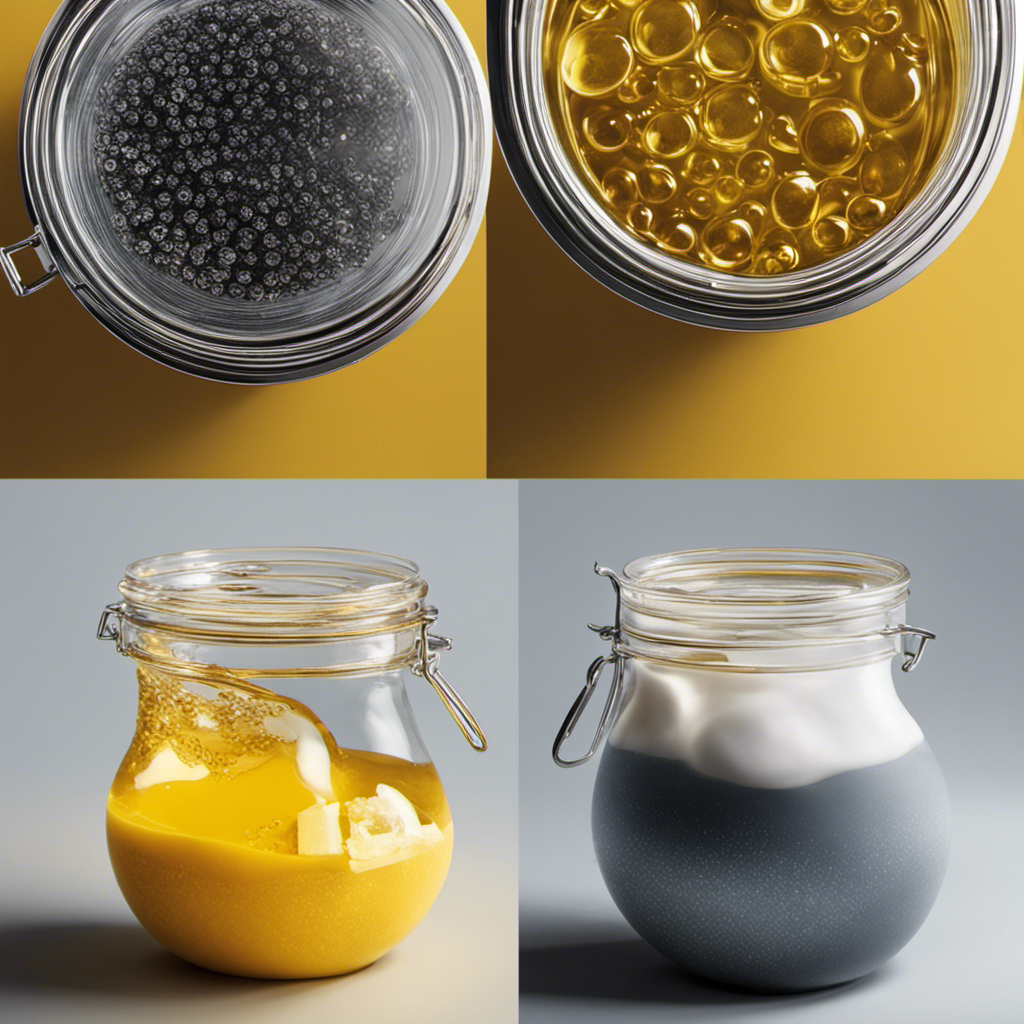I love butter. Its creamy, rich texture and the amazing flavor it adds to every dish are unmatched. But have you ever wondered what exactly goes into a butter sauce? Don’t worry, I’m here to satisfy your curiosity.
In this article, we’ll explore the history, types, benefits, and common ingredients of butter sauces. Whether you’re a culinary enthusiast or just someone who appreciates good food, understanding the art of making the perfect butter sauce will undoubtedly elevate your cooking game.
So, let’s dive in and unravel the wonders of this delectable culinary creation.
Key Takeaways
- Butter sauces have a long history and are an important part of culinary traditions in various cultures.
- There are different types of butter sauces, such as Beurre Blanc, Beurre Noisette, and Hollandaise, each with its own unique characteristics.
- Butter sauces enhance the flavor of dishes and add a velvety texture.
- Tips for making the perfect butter sauce include using high-quality ingredients, avoiding overcooking, and adding herbs and spices for added flavor.
History of Butter Sauces
Now let’s delve into the history of butter sauces and discover their origins.
Butter sauces have evolved over centuries, tracing back to ancient civilizations. The cultural significance of butter sauces cannot be overstated, as they have played a vital role in the culinary traditions of various cultures around the world.
The evolution of butter sauces can be seen in the different techniques and ingredients used throughout history. From the rich and velvety béarnaise sauce of French cuisine to the tangy and flavorful lemon butter sauce of Mediterranean dishes, these sauces have adapted and transformed over time.
Understanding the history of butter sauces allows us to appreciate their complexity and versatility. With this knowledge, we can now move on to explore the different types of butter sauces and their unique characteristics.
Types of Butter Sauces
First, let’s explore the different varieties of butter sauces.
In French cuisine, there are several variations of butter sauces that add richness and flavor to dishes. One popular type is the classic Beurre Blanc, made with white wine, vinegar, and shallots. It has a tangy and velvety texture that pairs perfectly with fish and seafood.
Another well-known butter sauce is Beurre Noisette, which is made by browning the butter until it develops a nutty aroma and flavor. This sauce is often drizzled over vegetables or used in desserts.
Lastly, we have the decadent Hollandaise sauce, made with egg yolks, butter, and lemon juice. It is a creamy and tangy sauce that is a staple in eggs Benedict.
These various butter sauces elevate the taste of dishes and add a touch of indulgence.
Now, let’s explore the benefits of using butter sauces.
Benefits of Using Butter Sauces
One of the advantages of using these creamy condiments is that they enhance the flavor of various dishes. Butter sauces are not only rich and indulgent, but they also add a velvety texture to any meal. However, there are both pros and cons to using butter sauces. On the positive side, butter sauces provide a depth of flavor that is hard to replicate with other ingredients. They can be used to elevate simple dishes like steamed vegetables or grilled chicken. Additionally, butter sauces are versatile and can be customized with herbs, spices, or citrus for a unique taste. On the downside, butter sauces are high in calories and saturated fat, which may not be suitable for those watching their intake. For those looking for alternative options, there are lighter alternatives such as olive oil-based sauces or vegetable broth reductions. Transitioning into the subsequent section about ‘common ingredients in butter sauces,’ let’s explore the key components that make these sauces so delicious.
| Pros of Using Butter Sauces | Cons of Using Butter Sauces | Alternative Options to Butter Sauces |
|---|---|---|
| Enhances flavor | High in calories | Olive oil-based sauces |
| Adds velvety texture | High in saturated fat | Vegetable broth reductions |
| Versatile | Not suitable for all diets | Light cream sauces |
Common Ingredients in Butter Sauces
To make a delicious creamy condiment, you’ll need a combination of melted butter, herbs, and spices. Butter sauces are incredibly versatile and can be customized to suit a variety of flavor variations. Whether you prefer a classic garlic butter sauce or want to experiment with different herbs and spices, the possibilities are endless.
One of the great things about butter sauces is that they can be made using different cooking techniques. You can simply melt the butter and mix in the herbs and spices, or you can go a step further and create a reduction by cooking the sauce over low heat until it thickens. Whichever technique you choose, the result will be a rich and flavorful sauce that adds a touch of decadence to any dish.
Tips for Making the Perfect Butter Sauce
When making the perfect butter sauce, it’s important to use high-quality ingredients and to not overcook the mixture.
To make butter sauce from scratch, start by melting butter in a saucepan over low heat. Once melted, add in minced garlic and cook until fragrant.
Next, whisk in flour to create a roux and cook for a minute to remove any raw taste. Slowly pour in chicken or vegetable stock, whisking constantly to avoid lumps. Allow the sauce to simmer and thicken for a few minutes.
Frequently Asked Questions
Can Butter Sauces Be Used in Both Sweet and Savory Dishes?
Butter sauces can be used in both sweet and savory dishes. They add richness and depth of flavor to a variety of dishes, allowing for creative flavor combinations that can enhance the taste of both sweet and savory ingredients.
Are There Any Alternatives to Using Butter in Butter Sauces?
There are alternatives to using butter in butter sauces. Vegan options for butter sauces include plant-based spreads, such as coconut oil or olive oil, which can provide a similar richness and flavor.
Can Butter Sauces Be Made Ahead of Time and Stored for Later Use?
Yes, butter sauces can be made ahead of time and stored for later use. This has the benefit of saving time and allowing the flavors to develop even further, resulting in a more delicious sauce.
Are There Any Health Concerns Associated With Consuming Butter Sauces?
When it comes to butter sauces, it’s important to consider the potential health benefits and risks. While these sauces can add richness and flavor to dishes, they should be enjoyed in moderation to maintain a balanced diet.
Can Butter Sauces Be Frozen for Future Use?
Freezing butter sauces can affect their taste and texture. However, by properly storing them, you can maintain their quality. To freeze, transfer the sauce to an airtight container and keep it in the freezer for up to 3 months.
Conclusion
In conclusion, butter sauces are a versatile and delicious addition to any dish. From the rich and decadent hollandaise sauce to the tangy and flavorful beurre blanc, there is a butter sauce to suit every taste.
Not only do butter sauces add a luscious texture to your favorite meals, but they also provide numerous health benefits. Did you know that a study found that using butter sauces in moderation can actually help improve your body’s absorption of fat-soluble vitamins?
So go ahead and indulge in the creamy goodness of a butter sauce, knowing that it’s not only delicious but also beneficial for your health.









